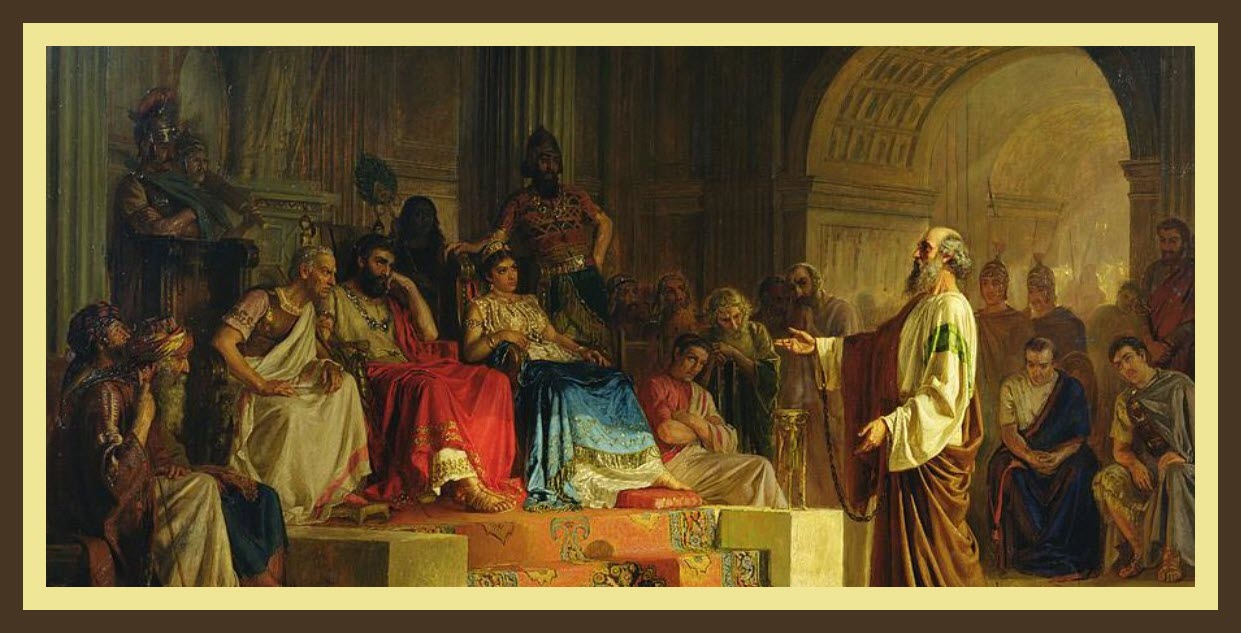

Chapter 3 – All have sinned; Jews & Gentiles are all sinners; The law
exposes sin;
The
law of faith is the answer;
Justification
So
Paul sweeps both the ‘bad’ and ‘good’ sinners into one big heap saying
that
no-one is better than anyone else. All are sinners in the sight
of God.
Paul shows that both Jews and Gentiles are all under sin with the
difference
that the Jew have been given the oracles of God. But God’s laws weren’t
given
to save the Jew but to condemn him such that he might know sin. Indeed
the
whole world is guilty before God (v19) for by the law is the knowledge
of sin
(v20).
Paul
then reveals the righteousness of God who is Jesus Christ manifest in
the flesh
(v22).
Furthermore,
no one can be justified before God by trying to keep his laws. As Paul
states,
there is only one way to access God’s grace and that is by Being
justified freely by his grace through the
redemption that is in Christ Jesus: Rom
3:24.
Paul
then states that the only sacrifice that God will accept (called a
propitiation) is the blood of Christ (25). God will justify those who
believe
in Jesus (v26).
Paul
then introduces a law, other than Moses’ laws, and he calls it the law
of faith
(v27).
In
summary then, God uses the first three
chapters of Romans to establish the universal nature of man’s sin.
But
God’s laws have exposed sin. Why? It’s obvious that if there were no
laws,
there would be no sin. As a result, if the law exposes sin, it stands
to reason
that laws can’t make sin ‘go away’. God’s remedy is the law of
faith.
Chapters 4,5
=
Justification
Ch. 4 – Abraham’s faith;
Justified
without works; Imputed righteousness
So
in chapter four, Paul presents the
unique and ‘two-sided’ Abraham who straddles the fence by having a foot
in both
camps of the Jew and the Gentile.
The
Jews have Abraham as their physical
ancestor but they do not, and will
not, have his faith.
The
Gentiles do not have Abraham as
their ancestor but can have his
faith.
The
Jew was angry and incensed that the Gentile could have access to the
grace of
God the Father even though they weren’t Jews.
Paul
aggravates the Jew further by having the Gentile call Abraham our
father (v 1)
This
was unforgiveable to the Jewish race, who of all men, vigorously
pursued their
righteousness by the privileges they enjoyed as God’s people, and they
added
them to the works they performed.
Back
in chapter two, Paul tells them that a true Jew has been circumcised in
the
heart not just circumcised in the flesh.
28
For he is not a Jew, which
is
one outwardly; neither is that
circumcision, which is outward in the flesh: 29 But
he is a Jew, which is one
inwardly; and circumcision is that
of the heart, in the
spirit, and not in the letter;
whose praise is not of men, but
of God. Rom 2:28-29
So
Paul makes it absolutely clear, that the Jew cannot be justified before
God
just because they are the physical heirs of Abraham and try to have a
righteousness resulting from their works. If they wish to be genuine
heirs of
faith, they must be of Abraham’s faith who was justified before God without works. As
Paul says But to him that worketh
not, but believeth on him that justifieth the ungodly,
his faith is
counted for righteousness. Rom 4:5. This is called imputed
righteousness.
Now Abraham received this
righteousness before he was circumcised as a Jew. How could this
happen? God
gave him a promise that couldn’t be believed in the natural. God
promised
Abraham who was one hundred years old, and beyond the fertile stage
necessary
to have children, and his wife Sarah was dead in the womb, that he
would be the
father of many nations and countless children. Wow! Who’d believe that?
Well,
Abraham did and therefore God rewarded him by giving him a
righteousness
(imputed) that couldn’t be gained by works. Abraham was given
right-standing
with God, not of any works he could do, but simply by believing that
God would
do what he said he would do. As Paul says, Abraham’s belief, his faith,
was
counted to him for righteousness (v5). Though it seemed impossible in
the
natural, God eventually made it come true.
Paul ends up with the
parallel of our situation in that, without works, a man can get to
heaven by
believing that Christ lived the perfect sinless life, and that Christ’s
blood
can wash away the penalty of all sin (v24-25) by believing on him
(v24). Just
as Abraham was dead in the body but God let him give birth, we,
spiritually
speaking are dead in trespasses and sins, but we become born again.
An aside: God sees sin and demands
a blood sacrifice. Under the Old Testament this was imperfect animal
blood
which was only a temporary payment and had to be repeatedly performed.
Only
God’s blood could permanently satisfy God and what God’s law demanded. God
dying on the cross, was the highest honour that he could pay his law.
The
fact that a universe of people can get saved and go to heaven is a
secondary
consideration.
**** ****
Harley
Hitchcock
www.
AustralianBibleMinistries
.com